Polls Say Throw All The BIGS — Big Interventionist Government Statists — Out Including Obama, Democrats and Republican BIGS — 60% of Americans Say Third Party Is Needed in Gallup Poll! — Videos
“The AP-GfK poll finds few people approve of the way the president is handling most major issues and most people say he’s not decisive, strong, honest, reasonable or inspiring.”
Gallup: 60% of Americans say third party needed
NBC/WSJ Poll: 60 Percent Say Fire Every Member Of Congress
AP-GfK Poll: GOP Gets the Blame in Shutdown
Chuck Todd: NBC News Poll Shows GOP’s Shutdown Made Obamacare ‘Less Unpopular’
In U.S., Perceived Need for Third Party Reaches New High
Twenty-six percent believe Democratic and Republican parties do adequate job
This article is part of an ongoing series analyzing how the government shutdown and the debate over raising the debt ceiling are affecting Americans’ views of government, government leaders, political parties, the economy, and the country in general.
PRINCETON, NJ — Amid the government shutdown, 60% of Americans say the Democratic and Republicans parties do such a poor job of representing the American people that a third major party is needed. That is the highest Gallup has measured in the 10-year history of this question. A new low of 26% believe the two major parties adequately represent Americans.
The results are consistent with Gallup’s finding of more negative opinions of both parties since the shutdown began, including a new low favorable rating for the Republican Party, and Americans’ widespread dissatisfaction with the way the nation is being governed.
The prior highs in perceived need for a third party came in August 2010, shortly before that year’s midterm elections, when Americans were dissatisfied with government and the Tea Party movement was emerging as a political force; and in 2007, when the newly elected Democratic congressional majority was clashing with then-President George W. Bush.
A majority of Americans have typically favored a third party in response to this question. Notably, support has dropped below the majority level in the last two presidential election years in which Gallup asked the question,2012 and 2008. Support for a third party was lowest in 2003, the first year Gallup asked the question. That year, 40% thought the U.S. needed a third party, while 56% believed the Republicans and Democrats were doing an adequate job.
Republicans, Democrats Equally Likely to See Need for Third Party
Republicans (52%) and Democrats (49%) are similar in their perceptions that a third party is needed. In fact, this marks the first time that a majority of either party’s supporters have said a third party is needed.
As would be expected, a majority of independents — those who profess no initial allegiance to either party — have always said the U.S. needs a third party. Seventy-one percent currently hold that view, which has been exceeded twice before, in 2007 and 2010.
Implications
Given the inability of the Republican and Democratic parties to agree on the most basic of government functions — passing an annual budget to pay for federal programs — it is perhaps not surprising that the percentage of Americans who believe a third party is needed has never been higher.
However, the desire for a third party is not sufficient to ensure there will be one. Structural factors in the U.S. election system and the parties’ own abilities to adapt to changing public preferences have helped the Republican and Democratic parties to remain the dominant parties in U.S. government for more than 150 years. Third parties that have emerged to challenge their dominance have not been able to sustain any degree of electoral success.
For results based on the total sample of national adults, one can say with 95% confidence that the margin of sampling error is ±4 percentage points.
Interviews are conducted with respondents on landline telephones and cellular phones, with interviews conducted in Spanish for respondents who are primarily Spanish-speaking. Each sample of national adults includes a minimum quota of 50% cellphone respondents and 50% landline respondents, with additional minimum quotas by region. Landline and cell telephone numbers are selected using random-digit-dial methods. Landline respondents are chosen at random within each household on the basis of which member had the most recent birthday.
Samples are weighted to correct for unequal selection probability, nonresponse, and double coverage of landline and cell users in the two sampling frames. They are also weighted to match the national demographics of gender, age, race, Hispanic ethnicity, education, region, population density, and phone status (cellphone only/landline only/both, and cellphone mostly). Demographic weighting targets are based on the March 2012 Current Population Survey figures for the aged 18 and older U.S. population. Phone status targets are based on the July-December 2011 National Health Interview Survey. Population density targets are based on the 2010 census. All reported margins of sampling error include the computed design effects for weighting.
In addition to sampling error, question wording and practical difficulties in conducting surveys can introduce error or bias into the findings of public opinion polls.
http://www.gallup.com/poll/165392/perceived-need-third-party-reaches-new-high.aspx
Poll: Americans find little to like in Washington
By NEDRA PICKLER and JENNIFER AGIESTA
Americans are finding little they like about President Barack Obama or either political party, according to a new poll that suggests the possibility of a “throw the bums out” mentality in next year’s midterm elections.
The AP-GfK poll finds few people approve of the way the president is handling most major issues and most people say he’s not decisive, strong, honest, reasonable or inspiring.
In the midst of the government shutdown and Washington gridlock, the president is faring much better than his party, with large majorities of those surveyed finding little positive to say about Democrats. The negatives are even higher for the Republicans across the board, with 4 out of 5 people describing the GOP as unlikeable and dishonest and not compassionate, refreshing, inspiring or innovative.
Negativity historically hurts the party in power – particularly when it occurs in the second term of a presidency – but this round seems to be hitting everyone. More people now say they see bigger differences between the two parties than before Obama was elected, yet few like what either side is offering. A big unknown: possible fallout from the unresolved budget battle in Washington.
The numbers offer warning signs for every incumbent lawmaker, and if these angry sentiments stretch into next year, the 2014 elections could feel much like the 2006 and 2010 midterms when being affiliated with Washington was considered toxic by many voters. In 2006, voters booted Republicans from power in the House and Senate, and in 2010, they fired Democrats who had been controlling the House.
“There needs to be a major change,” said Pam Morrison, 56, of Lincoln, Neb., among those who were surveyed. “I’m anxious for the next election to see what kind of new blood we can get.”
Morrison describes herself as a conservative Republican and said she is very concerned about how her adult children are going to afford insurance under Obama’s health care law. She places most of the blame for the shutdown on the president, but she also disapproves of the job Congress is doing. “I don’t think they’re working together,” Morrison said.
“Congress needs to take a look at their salaries, they need to take a cut to their salaries and they need to feel some of the pain the American people are feeling,” said Morrison, who is married to a government worker who she said has been deemed essential and is still on the job.
People across the political spectrum voiced disappointment.
Suzanne Orme, a 74-year-old retiree and self-described liberal who lives in California’s Silicon Valley, says the shutdown is more the Republican Party’s fault. “The Republicans seem to be a bunch of morons who aren’t going to give in for anything. I just don’t get it with them. They are just crazy,” she said.
But she also said she strongly disapproves of the way Obama is handling his job, and doesn’t find him likable, decisive, strong, honest, compassionate, refreshing, ethical, inspiring or reasonable. The only positive attribute she gave him was innovative.
“It sounds like he’s kind of weak. He says one thing and does another,” Orme said after taking the survey. For example, she said Obama hasn’t made good on his promise to close the U.S. detention center at Guantanamo Bay, Cuba, and changed his position on whether people should be penalized for failing to get health insurance.
“I voted for him, and he’s turned out to be a big disappointment,” she said. “I mean, what’s the alternative?” Orme said it just seems to her that Washington is run by lobbyists and consumed by financial greed.
A bad sign for Democrats is that Obama has bled support among independents – 60 percent disapprove of the way Obama is handling his job, while only 16 percent approve. As he began his second term in January, independents tilted positive, 48 percent approved and 39 percent disapproved.
Neither party can win without the support of independents, with only about a third of the poll’s respondents identifying themselves as Democrats and about a quarter as Republicans.
Obama has held onto support from Carol Cox, a 59-year-old independent from Hartville, Ohio, who says she feels the president helps people in need. She is happy to see his health care law that offers coverage to the uninsured and to people with pre-existing conditions, although she thinks the rollout could have been better. “I think he’s doing an OK job,” she said of the president.
But she is not happy with either party in Congress. She said the shutdown is affecting her family’s investments and she’s concerned about the future of Social Security. “I’m really angry and frustrated. I can’t believe how mad I am about this.”
As for next year’s congressional election, she said, “I would love to see just a total turnover.”
The AP-GfK Poll was conducted Oct. 3-7, 2013, using KnowledgePanel, GfK’s probability-based online panel. It involved online interviews with 1,227 adults and has a margin of sampling error of plus or minus 3.4 percentage points for all respondents.
The survey was designed to be representative of the U.S. population. Respondents to the survey were first selected randomly using phone or mail survey methods and later interviewed online. Those who didn’t otherwise have access to the Internet were provided with the ability to get online at no cost.
—
News Survey Specialist Dennis Junius contributed to this report.
http://apnews.myway.com/article/20131011/DA9BQJ1G0.html
NBC/WSJ poll: 60 percent say fire every member of Congress
By Domenico Montanaro, Deputy Political Editor, NBC News
Throw the bums out.
That’s the message 60 percent of Americans are sending to Washington in a new NBC News/Wall Street Journal poll, saying if they had the chance to vote to defeat and replace every single member of Congress, including their own representative, they would. Just 35 percent say they would not.
The 60 percent figure is the highest-ever in that question recorded in the poll, registered in the wake of the government shutdown and threat of the U.S. defaulting on its debt for the first time in history. If the nation’s debt limit is not increased one week from now, Treasury Secretary Jack Lew warns that the entire global economy could be in peril.
“We continue to use this number as a way to sort of understand how much revulsion there is,” said Democratic pollster Peter D. Hart, who conducted the poll with Republican Bill McInturff. “We now have a new high-water mark.”
Read the full poll here (.pdf)
The numbers reflect a broader trend over the last few years. Americans have traditionally said that while they might not like Congress, they usually like their own representatives. But that sentiment appears to have shifted.
The throw-them-all-out attitude has slowly taken hold over the last three years, coinciding with two things – the rise of the Tea Party caucus in the House and the debt ceiling fight of 2011.
In October 2010, a majority of Americans – 50 percent to 47 percent – said they would not fire all congressional members. But by August 2011, 54 percent said they would toss every lawmaker from office; in January 2012, 56 percent said that; and just three months ago, in July, it was 57 percent.
Frustration was evident among poll respondents across the ideological spectrum.
“You look at 800,000 people being out of work merely because Congress can’t come to an agreement to do their job, which we sent them there to do,” said a respondent from Mississippi, a strong Democrat. “I am prayerful for a revolution.”
The sentiment isn’t limited to Democrats. One Ohio woman, who considers herself a strong Republican, said her husband is a federal worker and they are worried about paying the bills.
“We will not get a paycheck,” she said. “It is federal pay and mortgage is due. Who is going to pay that — Obama or Congress who is still getting paid?”
Hart points out that the seeds are there to give rise to independent or third-party candidates.
According to Hart, “Somewhere, someone’s going to pick up and run with the ‘throw them all out’” banner.
The number of Americans who say they want to fire everyone is fairly consistent among most groups – at around 60 percent – but it spikes among rural voters (70 percent), white independents (70 percent) and those in Republican-held congressional districts (67 percent). Just 52 percent of respondents in Democratic-held districts would vote to fire every lawmaker on Capitol Hill.
In another sign of dissatisfaction with the state of politics, 47 percent of Americans said they do not strongly identify with either party.
The numbers in this poll also reflect a broader anger and pessimism among Americans, especially when it comes to the economy.
A record-low 14 percent think the country is headed in the right direction, down from 30 percent last month. That’s the biggest single-month drop in the poll since the shutdown of 1990. And a whopping 78 percent think the country is on the wrong track. Just 17 percent think the economy will improve in the next year, while 42 percent think it will worsen.
Americans’ confidence in the economy has nose-dived, they say, because of President Barack Obama and congressional Republicans’ negotiations – or lack thereof – on the budget. Almost two in three – 63 percent – say it makes them less confident that the economy will get better.
“What these numbers tell us is that the already-shaken public – this kicked the stool out from under them,” Bill McInturff said. “We’re seeing numbers that are associated with historic lows in public confidence.”
Almost two-thirds – 65 percent – also say the government shutdown is having quite a bit or a great deal of harm on the U.S. economy.
“That linkage between these actions in Washington and economic confidence and what that means for trying to stabilize our economy, I think at a big-picture level [shows] how destabilizing” the standoff has been for the economy.
Democratic pollster Fred Yang, who helped conduct the poll with Hart, added that Americans are paying attention to this fight and want it resolved before the debt ceiling deadline of Oct. 17.
“This isn’t the calm before the storm,” Yang said. “This is the storm before the storm.”
Republicans Should Fight or Give Up
There is nothing in the middle.
By Jay Cost Staff Writer
The findings of the newly released NBC News/Wall Street Journal poll are simply brutal for congressional Republicans. Not only are they getting the lion’s share of the blame for the government shutdown, but President Obama’s numbers have actually improved. Worse, Obamacare’s numbers are improving, as well.
That poll caused quite a sensation on Twitter last night, and while it is worse for Republicans than recent readings from the Associated Press’s poll, NBC News/Wall Street Journal has a long track record of solid readings. This is not a result to be taken lightly.
Moreover, it makes empirical sense considering the message coming from congressional Republicans in the last week—or perhaps better put the lack of a message. Marc Thiessen of the Washington Post aptly labeled this the “Seinfeld Shutdown,” a shutdown about nothing. That is not how it was supposed to be, of course. It was supposed to be a shutdown about Obamacare, but Republican leaders were quickly sidetracked by low-hanging fruit like the closure of the National Mall, Harry Reid’s gaffes, and Obama’s refusal to negotiate. Tactically, this might have made sense, but strategically it was a terrible move. If the shutdown was supposed to be about Obamacare, then that should have been the only topic Republicans discussed.
Moreover, insofar as Republican leaders have discussed Obamacare, they have done so ineptly, and have repeated Mitt Romney’s grievous mistakes from 2012. Looking at the topline numbers on Obamacare, we can see it is very unpopular, but dig a little deeper and only about 30 to 40 percent of people believe that the law will make them worse off. This is a significant failure in political communication by the Republican party. Government agencies like the Congressional Budget Office and the Centers for Medicare and Medicaid Services have warned since 2010—in their dry, technocratic rhetoric—that Obamacare was going to harm middle class families. For weeks now stories have been trickling out about people receiving letters from their insurers notifying them that their rates are being doubled. For over a year we have similarly heard stories about hiring freezes or hours being cut because of Obamacare. And yet despite all this hard data, the public still has not connected the dots.
The blame belongs not to the Tea Party, not to the Republican grassroots, not to the back-benchers in the House, but to the party’s leaders, the ones who have the microphones stuck in their faces every day. They, and only they, have the power to make the case to the American people that Obamacare is such a danger to them that it needs to be gotten rid of as soon as possible. Mitt Romney should have, but did not, get on the television in late October 2012 to warn people that a vote for Obama was a vote to double their premiums, make it harder for grandma to get hospital care, and make it harder for you to make your ends meet because of job cutbacks. Similarly, Republicans should have, but did not, acknowledge that while the shutdown was harming certain sectors of the country, it was far less damaging then the havoc Obamacare is set to wreak on the people.
And so it is that people would rather have the government reopened (largely a symbolic gesture as this shutdown has left vast swaths of the country unaffected) than have Obamacare dismantled (something that will prevent material harm done to millions of middle class people).
Obamacare is not going to defeat itself. If it is going to be taken down, it is up to the Republican party to formulate a coalition of people who have been or will be made worse off because of it. Those people are out there, but Republicans have failed to unite and mobilize them under the party’s banner. So long as they continue to fail on this front, Obamacare will remain on the books. It has the benefit of our system’s status quo bias, and Democrats have an 80-year track record of capturing interests through the distribution of benefits, transforming them into party clients, and delivering them at the ballot box.
Republican leaders tend to come from one of two camps. The first is the go-along-to-get-along camp that is happy merely to manage the never-ending growth of government. The second wants to cut back on the size of government, but couches their rhetoric in the hazy, forgotten past of the country’s founding; their arguments against the growth of government are always framed in terms of the Constitution, the rights of man, or other abstract concepts that have little impact on the lives of average American.
Ronald Reagan was the only political leader since the New Deal to argue effectively that government should be reduced because it is bad for people in a concrete sense. Yes, he talked about the Founding, and yes he was willing to compromise where it counted. But in his Inaugural Address he said, “Government is not the solution to our problem; government is the problem.” For the next quarter century, American liberalism was on the run, so effective was Reagan’s framing of the debate.
Republicans who wonder why they have generally failed to win national electoral victories since Reagan should ponder his statement, and how they have failed to expand upon it. Poll after poll indicates that today it is a popular position. People think government is harming them. If Republicans want to win, not just electoral victories, but policy victories, they need to follow the Gipper and explain in real terms how government is harming average Americans and how they will fix those harms. They have failed to do that in general over the last decade, and they have failed to do that in particular with Obamacare. It is a big reason why they only control the House and why Obamacare is still on the books.
And if congressional Republicans are not prepared to begin making that case loud and clear right now, the sooner they capitulate the better. Their only hope of victory in this fight is to convince the public that keeping Obamacare is worse than shutting down the government. If they are not prepared to make that case, then they have no hope of winning.
http://www.weeklystandard.com/blogs/republicans-should-fight-or-give_762423.html
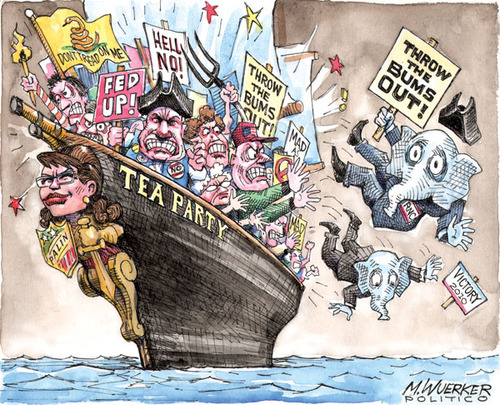
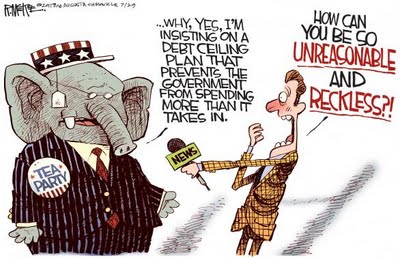
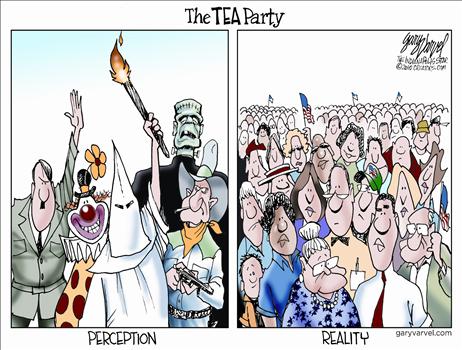
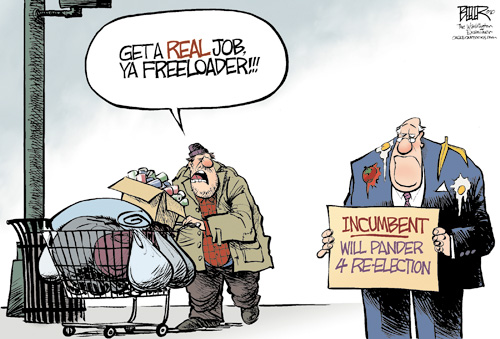
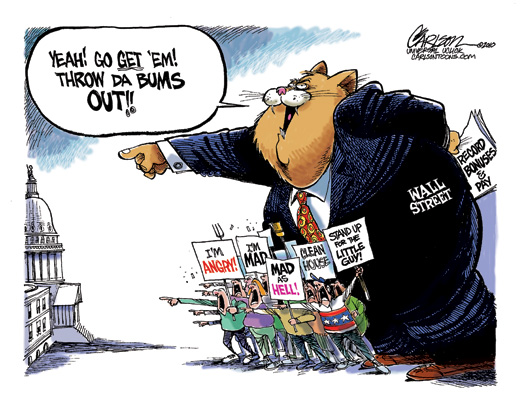
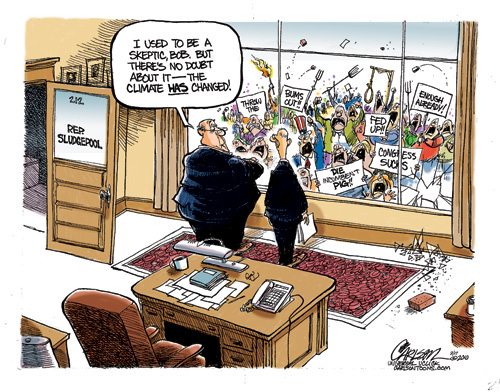
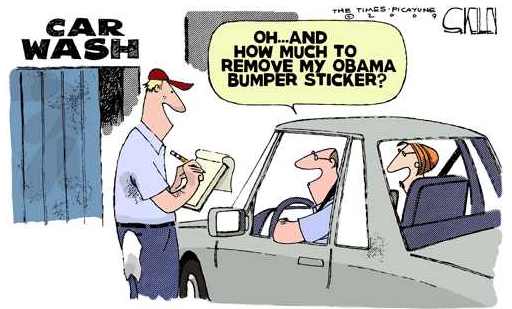
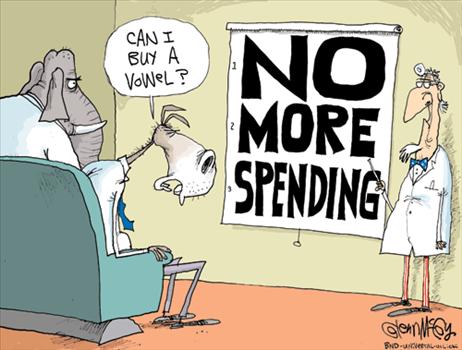
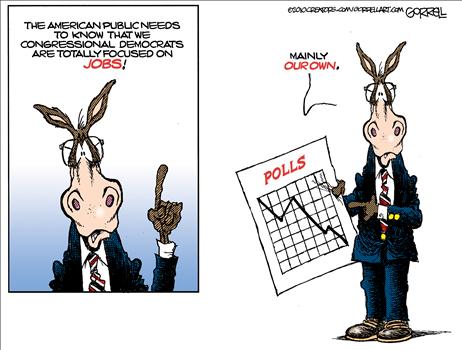

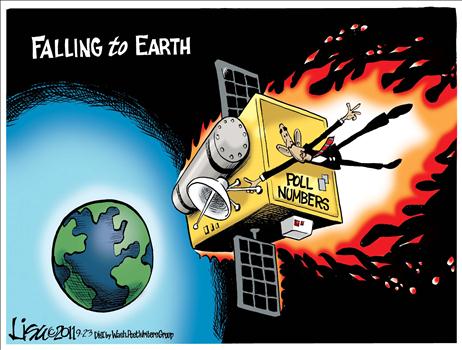

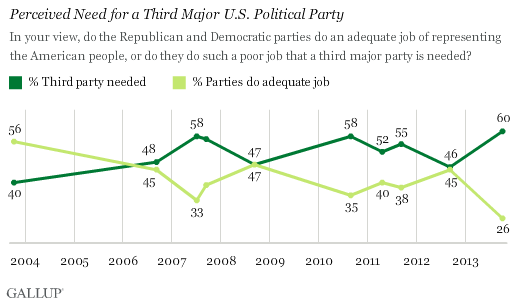
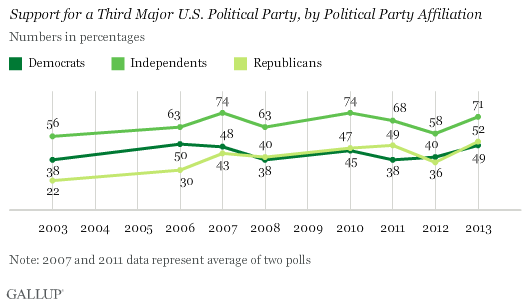
Leave a comment